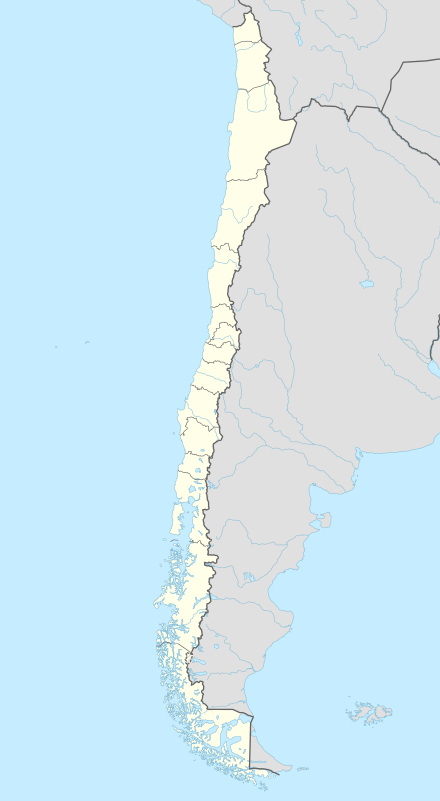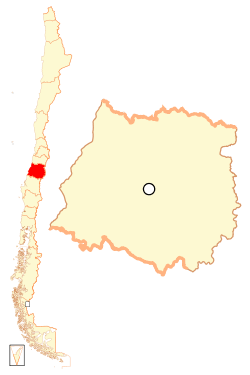Pelarco
| Pelarco | ||||
|---|---|---|---|---|
| Town and Commune | ||||
| ||||
| Coordinates: 35°23′S 71°27′W / 35.383°S 71.450°WCoordinates: 35°23′S 71°27′W / 35.383°S 71.450°W | ||||
| Country | Chile | |||
| Region | Maule | |||
| Province | Talca | |||
| Government[1][2] | ||||
| • Type | Municipality | |||
| • Alcalde | Alfredo Pérez Leiva (Ind.) | |||
| Area[3] | ||||
| • Total | 331.5 km2 (128.0 sq mi) | |||
| Elevation | 136 m (446 ft) | |||
| Population (2012 Census)[3] | ||||
| • Total | 7,632 | |||
| • Density | 23/km2 (60/sq mi) | |||
| • Urban | 1,822 | |||
| • Rural | 5,444 | |||
| Sex[3] | ||||
| • Men | 3714 | |||
| • Women | 3552 | |||
| Time zone | CLT [4] (UTC-4) | |||
| • Summer (DST) | CLST [5] (UTC-3) | |||
| Area code(s) | (+56) 71 | |||
| Website |
www | |||
Pelarco is a town and commune in Talca Province, Maule Region of Chile. The commune spans an area of 331.5 km2 (128 sq mi).[3]
Demographics
According to data from the 2002 Census of Population and Housing, Pelarco had 7,266 inhabitants; of these, 1,822 (25.1%) lived in urban areas and 5,444 (74.9%) in rural areas. At that time, there were 3,714 men and 3,552 women. The population fell 5.0% (382 persons) between the 1992 and 2002 censuses.[3]
Administration
As a commune, Pelarco is a third-level administrative division of Chile administered by a municipal council, headed by an alcalde who is directly elected every four years. The 2008-2012 alcalde is Alfredo Pérez Leiva (Ind.).[1][2]
Within the electoral divisions of Chile, Pelarco is represented in the Chamber of Deputies by Pablo Lorenzini (PDC) and Pedro Pablo Alvarez-Salamanca (UDI) as part of the 38th electoral district, (together with Curepto, Constitución, Empedrado, Pencahue, Maule, San Clemente, Río Claro and San Rafael). The commune is represented in the Senate by Juan Antonio Coloma Correa (UDI) and Andrés Zaldívar Larraín (PDC) as part of the 10th senatorial constituency (Maule-North).
References
- 1 2 "Asociación Chilena de Municipalidades" (in Spanish). Retrieved 22 January 2011.
- 1 2 "Municipality of Pelarco" (in Spanish). Retrieved 22 January 2011.
- 1 2 3 4 5 "National Statistics Institute" (in Spanish). Retrieved 29 August 2010.
- ↑ "Chile Time". WorldTimeZones.org. Retrieved 2010-08-29.
- ↑ "Chile Summer Time". WorldTimeZones.org. Retrieved 2010-08-29.
External links
- (Spanish) Municipality of Pelarco


